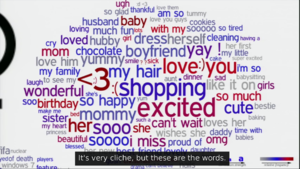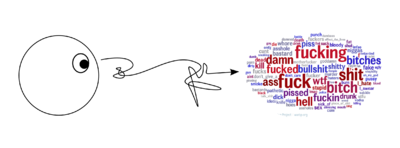I-could-have-written-that: Difference between revisions
No edit summary |
No edit summary |
||
| Line 5: | Line 5: | ||
|Thumbnail=I-could-have-written-that these-are-the-words mb.png | |Thumbnail=I-could-have-written-that these-are-the-words mb.png | ||
|Website=http://www.manettaberends.nl | |Website=http://www.manettaberends.nl | ||
|Description= | |Description=''i-could-have-written-that'' is a workshop on the subject of text mining, a technology that uses statistics and computational linguistics to extract knowledge from the overwhelming amount of digital text that are published online. Under motto's like ''"the power to know"'', text mining services offer pre-trained classfiers through API's without specifying how the system is created. The workshop challenges the image of this modern oracle, by discussing how the software, workprocess and vocabulary together construct text mining outcomes. more info: [http://i-could-have-written-that.info i-could-have-written-that.info] | ||
}} | }} | ||
[[File:Perceiving-a-wordcloud.png| | [[File:Perceiving-a-wordcloud.png|400px]] | ||
The overwhelming amount of digital text available these days, is presented as the problem that can be solved by algorithmic processes: text mining. Text classification is one of subsections, in which statistics are combined with techniques that process natural language. The technology is used widely to detect i.e. sentiment, depression, education level, phedophilia or to prevent terrorism. Text mining is presented with untenable enthusiasm and a strong belief in its reading abilities. However, an actual text mining process is messy and chaotic. Altough the eventual results are presented as being read or mined from the text, they show more similarities to something that is written. This research project shows how text mining results are never an absolute truth, but are constructed through a dirty and messy collaboration between software, its culture, the text miner and the authorative power of language. | |||
Revision as of 10:33, 25 May 2016
| I-could-have-written-that | |
|---|---|
| Creator | Manetta Berends |
| Year | 2016 |
| Bio | Manetta Berends (NL) has been educated as a graphic designer at ArtEZ, Arnhem before starting her master-education at the Piet Zwart Institute (PZI), Rotterdam. From an interest in linguistics, code and a research based design practice, she currently works on the systemization of language in the field of natural language processing and text mining. |
| Thumbnail | |
| Website | http://www.manettaberends.nl |
i-could-have-written-that is a workshop on the subject of text mining, a technology that uses statistics and computational linguistics to extract knowledge from the overwhelming amount of digital text that are published online. Under motto's like "the power to know", text mining services offer pre-trained classfiers through API's without specifying how the system is created. The workshop challenges the image of this modern oracle, by discussing how the software, workprocess and vocabulary together construct text mining outcomes. more info: i-could-have-written-that.info
The overwhelming amount of digital text available these days, is presented as the problem that can be solved by algorithmic processes: text mining. Text classification is one of subsections, in which statistics are combined with techniques that process natural language. The technology is used widely to detect i.e. sentiment, depression, education level, phedophilia or to prevent terrorism. Text mining is presented with untenable enthusiasm and a strong belief in its reading abilities. However, an actual text mining process is messy and chaotic. Altough the eventual results are presented as being read or mined from the text, they show more similarities to something that is written. This research project shows how text mining results are never an absolute truth, but are constructed through a dirty and messy collaboration between software, its culture, the text miner and the authorative power of language.


